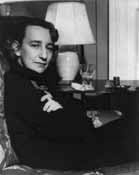 This Goodly Land
This Goodly Land
Lillian Hellman (June 20, 1905 or 1906–June 30, 1984)

Other Names Used
- Lillian Florence Hellman: full name
Alabama Connections
- Demopolis, Marengo County: home of mother’s family, setting for two plays
Selected Works
- Hellman, Lillian. The Children's Hour. New York: A. A. Knopf, 1935. Rpt. in The Collected Plays. Boston: Little, Brown, 1972.
- Hellman, Lillian. The Little Foxes. New York: Random House, 1939. Rpt. in The Collected Plays. Boston: Little, Brown, 1972.
- Hellman, Lillian. Watch on the Rhine: A Play in Three Acts. New York: Random House, 1941. Rpt. in The Collected Plays. Boston: Little, Brown, 1972.
- Hellman, Lillian. Another Part of the Forest: A Play in Three Acts. New York: Random House, 1947. Rpt. in The Collected Plays. Boston: Little, Brown, 1972.
- Hellman, Lillian. Toys in the Attic: A New Play. New York: Random House, 1960. Rpt. in The Collected Plays. Boston: Little, Brown, 1972.
- Hellman, Lillian. An Unfinished Woman: A Memoir. Boston: Little, Brown, 1969. Rpt. Boston: Little, Brown, 1999.
- Hellman, Lillian. Pentimento: A Book of Portraits. Boston: Little, Brown, 1973. Rpt. Boston: Back Bay Books, 2000.
- Hellman, Lillian. Scoundrel Time. Boston: Little, Brown, 1976. Rpt. Boston: Little, Brown, 2000.
Literary Awards
- New York Drama Critics Circle Award, Best Play, 1941, for Watch on the Rhine
- Inducted as a member of the National Institute of Arts and Letters, 1946
- New York Drama Critics Circle Award, Best Play, 1960, for Toys in the Attic
- Inducted as a member of the American Academy of Arts and Letters, 1963
- Gold Medal for Drama, National Institute of Arts and Letters, 1964
- National Book Award, Arts and Letters, National Book Foundation, 1970, for An Unfinished Woman
- Edward MacDowell Medal, MacDowell Colony, 1976
Biographical Information
Lillian Hellman was born in New Orleans. Her father was a shoe salesman, and her mother came from a well-to-do family in Demopolis, Ala. While she was growing up, the family spent part of the year in New York and part in New Orleans, where they stayed in a boardinghouse owned and run by her father’s sisters. Hellman attended New York University but left without a degree to work as a manuscript reader for the publishing house Boni and Liveright. Hellman began writing short stories, although she was not successful in publishing them. In 1930, Hellman moved with her husband to Hollywood where she met and became involved with the mystery writer Dashiell Hammett. Although their relationship was rocky, it continued until his death in 1961. Hammett strongly influenced her writing, critiquing draft versions of her writing efforts.
Hellman divorced her husband, and moved with Hammett to New York, where she worked as a script reader for a Broadway producer and began writing plays. Her first play to be produced, The Children's Hour, opened on Broadway in 1933. In 1935, Hellman returned to Hollywood as a screenwriter for MGM. Until the 1950s, she lived and worked in both New York and Hollywood and wrote both plays and screenplays. Hellman was active in leftist political causes. In 1952, she was accused of being a Communist and subpoenaed to appear before the U.S. Congress House Un-American Activities Committee. Fearing that an open discussion of her own activities would force her to name others, Hellman pled the Fifth Amendment. She was blacklisted and could no longer write for Hollywood, although she continued to write plays, some of which she also directed. In the late 1960s, Hellman ceased writing plays and began writing her memoirs, one of which, Scoundrel Time, was her version of the events of the McCarthy era. A chapter from another of her memoirs, Pentimento, was made into the motion picture Julia.
Interests and Themes
Lillian Hellman wrote plays with vivid characters, strong dialogue, and a moralistic tone. One of her most important themes was that good people must actively oppose evil or disaster will ensue. Two of her plays, The Little Foxes and Another Part of the Forest, are set in a fictionalized version of Demopolis, and the characters are based on her mother’s family.
For More Information
Please check your local library for these materials. If items are not available locally, your librarian can help you borrow them through the InterLibrary Loan program. Your librarian can also help you find other information about this author.
There may be more information available through the databases in the Alabama Virtual Library. If you are an Alabama citizen, AVL can be used at your public library or school library media center. You can also get a username and password from your librarian to use AVL at home.
Reference Books
- Rollyson, Carl. Lillian Hellman: Her Legend and Her Legacy. New York: St. Martin’s Press, 1988.
- Towns, Saundra. Lillian Hellman. New York: Chelsea House Publishers, 1989. For younger readers.
- Turk, Ruth. Lillian Hellman: Rebel Playwright. Minneapolis: Lerner Publications Co., 1995. For younger readers.
- Wright, William. Lillian Hellman: The Image, The Woman. New York: Simon and Schuster, 1986.
Location of Papers
- University of Texas at Austin
Photo courtesy of the Library of Congress, Prints & Photographs Division, LC-USZ62-83026.
Last updated on May 30, 2008.